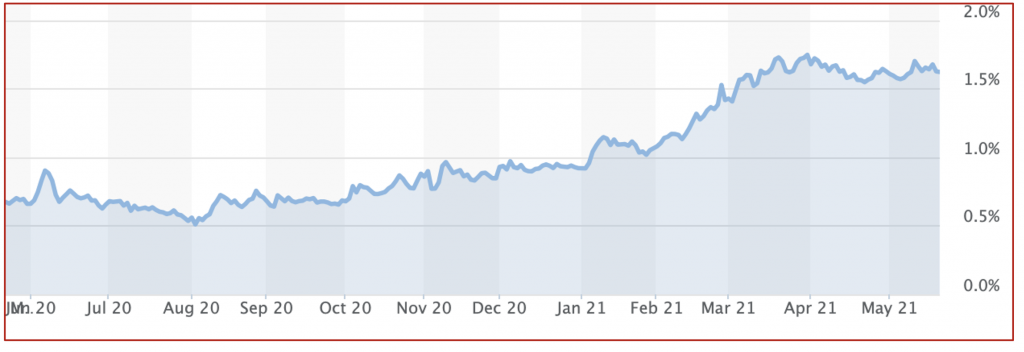
Why the Kogan share price has tanked
Online retailer, Kogan (KGN:ASX), was one of the standouts during the COVID lockdown, and its share price soared during 2020. But, with many of us heading back to work, there is now less need to spend our days shopping online. This has resulted in ballooning inventories and a plummeting share price. And it’s not the only e-tailer feeling the pinch.
Earlier this year we noted the stock market would likely remain supported but its “leadership” would change. That changing of the guard is now well entrenched.
The increase in long bond rates (Figure 1.) has had the predicted effect, through the present value formula, on the market valuations of the stocks I like to call ‘profitless prosperity’ stocks.
Figure 1. Rising US 10Yr Treasury yields will impact growthy growth
Kogan is now 65 per cent from its recent highs, and shares in companies including Laybuy Group, YouFoodz, MyDeal, Appen, Temple & Webster and Wisetech have all fallen dramatically.
Dartboard investing in technology, platform hopefuls, fintech and e-commerce names needs to be replaced with sound assessments of individual company leverage to a reopening, its competitive position, longer-term growth prospects, chance of success, and absolute and relative value.
Witness, for example, the share price performance of Kogan since its peak on 20 October 2020 (the curse of being on the front cover of the AFR Rich List Edition published 29 October 2020).
For some time, it was obvious to our small cap team that the sharp share price run into the final quarter of last year was coinciding with evidence that online spending growth rates were simply unsustainable. Despite an annual additional $43 billion of spending being re-directed domestically from overseas leisure travel, while international borders remained closed, our fixed population means consumer spending cannot continue to double (Table 1.).
Table 1. Growing at a declining rate
| Year | 1 | 2 | 3 | 4 |
| Dollar Value | $100 | $200 | $300 | $350 |
| Growth Rate | 100% | 50% | 17% | |
| Fall in Growth | 50% | 64% |
The growth rates recorded from ultra-low COVID levels cannot possibly continue and so growth rates simply have to fall.
And don’t forget the ‘Economics of Enough.’ After everyone has purchased a new TV, computer and laptop for their home office, they just don’t need another one for some time. Those purchases need to be ‘digested’ the products used, and a pause must take place until bank balances are rebuilt or new ‘must have’ technology demands a replacement.
Perhaps it was inexperience, perhaps it was taken by surprise, but Kogan’s recent announcement spooked investors who had probably thought the boom times would continue a little longer.
Perhaps enthused by the rapid growth Kogan management enjoyed in 2020, the company over-ordered inventory and expanded into too many logistics facilities. In only the last five months were many of the 31 new logistics facilities established.
Back in February Kogan reported that first half revenue grew 88.6 per cent to $414 million and gross sales rose by just shy of 100 per cent to $638 million. Before ‘one-offs’ EBITDA jumped 175 per cent to $51.7 million. That’s $51.7 million for the half year.
In the March quarter however gross revenue still grew but much more modestly – 32 per cent – and adjusted EBITDA for the full year is expected to be in the range of $58 million to $63 million. Not much more than the first half.
With growth slowing substantially, Kogan has been caught long a lot of stock. Stock that will potentially sit in warehouses for a long time if consumers are indeed sated by their recent buying binge. And don’t forget consumers are also heading back to work, thanks to the vaccine roll out. With bosses looking over their shoulders, they won’t have as many hours to shop online as they did under lockdown. Growth rates for many consumer goods may yet decline more rapidly. To move the stock, heavy price discounting, promotional activity and elevated marketing costs are all on the horizon.

Hello Roger. I know the small companies fund once had Adairs (ADH) as one of the preferred e-commerce firms in the portfolio. Seems from my analysis that ADH has astute management, and is better at managing growth, and balancing demand and inventory? Although I wonder, like with Kogan, how many more sheets and towels does the post-pandemic consumer need? Do you see the same decimation in earning ahead for ADH?
We can review that once the renovation (followed by interior decoration) boom slows David!
The Montgomery Small Companies Fund has retained its relatively small position in Adairs based on valuation and the medium-term earnings outlook where we actually see upside risk. For sure Adairs has been a COVID winner as people spend more time at home and spend up on things like homewares, and with stronger demand driving less promotional activity which benefits margins. However, Dominic and Gary’s view is that it has not seen demand pulled-forward to the same extent as sofas or TVs which are one-time purchases. Further, Adairs’ Linen Lovers loyalty program (members pay to join) has signed up more than 900,000 members (and still growing). These customers account for more than 75 per cent of Group sales and this program is designed to drive repeat purchases – most Linen Lovers shop 3-4 times a year. Adairs also has a relatively high exposure to Victoria which took longer to recover than the rest of the country. Another important note is that Mocka didn’t experience the same sales surge as Kogan or Temple & Webster because it was inventory constrained – this means Mocka won’t be lapping/comping 100% plus growth later in the year (a major concern for the other e-commerce stocks). We also like the fact consensus estimates have Adairs NPAT declining 14% in FY22. We think will be reviewed by the sell side analyst community. Given international borders will remain closed for some time and the domestic economy is very strong, we see upside risk to these expectations. Value looks good – ADH is trading on 12.4x FY22 EPS with a 5.4% yield and net cash on the balance sheet. While the small caps team remain underweight retail (COVID winners), they think ADH looks too cheap to sell.
Good piece Roger. Generally a good reminder, across the board, to consider growth rates vs TAM. And/or substitute vs new/disruptor. Kogan’s really a smart efficient substitute type product, compared to disruptors or companies making “new things” which start with 100% of the pie available to them (before their success invites competition, aka Xero), where these new things are global/easy take up tech related products, these pie’s/TAM’s are truly mammoth.
I feel the Kogan’s/smart substitutes have to originate from somewhere of huge scale, to then share the benefits of that scale else where and creating the economics to then go global, i.e Wingstop NYSE. This dynamic being very obvious from NZ.
Really good ideas there Mark. Like the logic. Thanks for sharing.